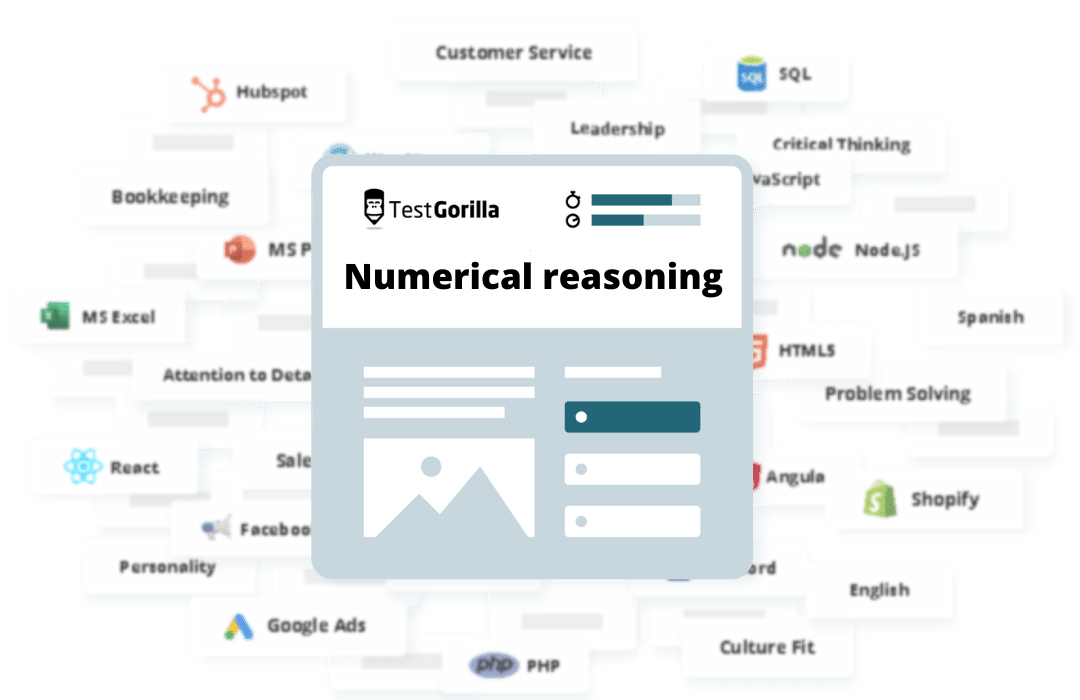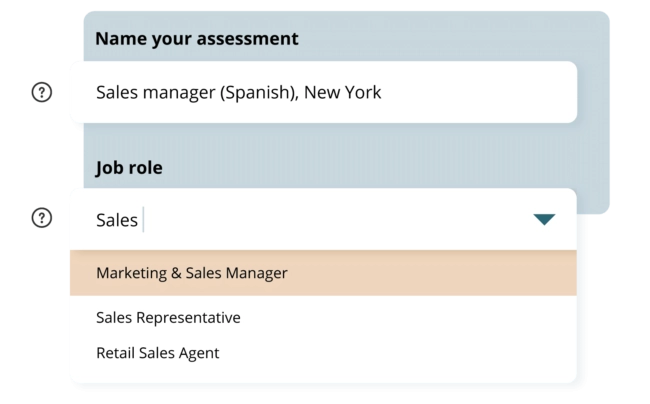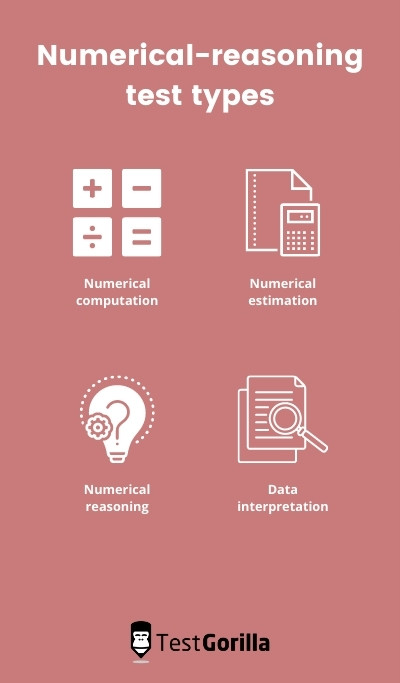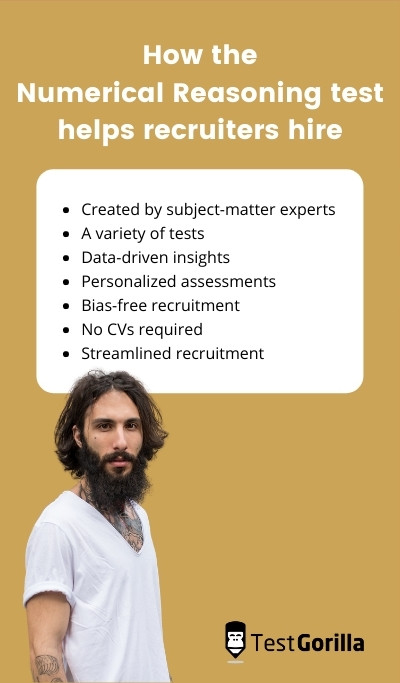Numerical reasoning test: Online skills assessment to screen and hire the best candidates
Summary of the Numerical reasoning test
This numerical reasoning test evaluates candidates’ general aptitude with numbers and their skill in interpreting them for a wide range of applications. This test will help you identify candidates with strong numerical skills.
Covered skills
Interpreting numbers, fractions, percentages
Understanding number patterns
Interpreting text and tables
Interpreting charts, graphs and diagrams
Use the Numerical reasoning test to hire
Any role in which numerical aptitude is important, especially if it involves dealing with financials (budgets, forecasts, business cases, etc.) or interpreting and developing (number-heavy) spreadsheets.
Type
Time
Languages
Level
About the Numerical reasoning test
As more business processes become all the more digitized, the ability to read graphs, analyze data, identify patterns, monitor figures, and draw conclusions for numerical datasets becomes all the more important. From finances to marketing, and from product development to customer success, nearly every department of the modern organization deals with numbers, data, and analytics.
The numerical reasoning test assesses candidates’ ability to reason from numbers through tasks that ask them to interpret numbers, fractions, and percentages, identify number patterns, and tables, charts, graphs, and diagrams. Candidates have to perform several operations on the data to arrive at the right answer.
Candidates who perform well on this test have a strong numerical aptitude. They can perform a wide variety of calculations and use numbers to solve problems, read patterns, and predict trends.
The test is made by a subject-matter expert
Anirban C.
The global IT industry has benefited from Anirban’s talents for over two decades. With a flawless reputation that precedes him, Anirban has earned a status as a sought-after agile project manager and consultant. He’s worked internationally as a Senior Project Manager with companies such as Ericsson, IBM, and T-Mobile.
Anirban’s love for learning helps him keep his skills sharp. He holds an MBA and a degree in engineering, is a certified Scrum Master, and has certifications in Prince2 and ITIL.
Crafted with expert knowledge
TestGorilla’s tests are created by subject matter experts. We assess potential subject-matter experts based on their knowledge, ability, and reputation. Before being published, each test is peer-reviewed by another expert, then calibrated using hundreds of test takers with relevant experience in the subject. Our feedback mechanisms and unique algorithms allow our subject-matter experts to constantly improve their tests.
What our customers are saying
TestGorilla helps me to assess engineers rapidly. Creating assessments for different positions is easy due to pre-existing templates. You can create an assessment in less than 2 minutes. The interface is intuitive and it’s easy to visualize results per assessment.
David Felipe C.
VP of Engineering, Mid-Market (51-1000 emp.)

Any tool can have functions—bells and whistles. Not every tool comes armed with staff passionate about making the user experience positive.
The TestGorilla team only offers useful insights to user challenges, they engage in conversation.
For instance, I recently asked a question about a Python test I intended to implement. Instead of receiving “oh, that test would work perfectly for your solution,” or, “at this time we’re thinking about implementing a solution that may or may not…” I received a direct and straightforward answer with additional thoughts to help shape the solution.
I hope that TestGorilla realizes the value proposition in their work is not only the platform but the type of support that’s provided.
For a bit of context—I am a diversity recruiter trying to create a platform that removes bias from the hiring process and encourages the discovery of new and unseen talent.
David B.
Chief Talent Connector, Small-Business (50 or fewer emp.)

Use TestGorilla to hire the best faster, easier and bias-free
Our screening tests identify the best candidates and make your hiring decisions faster, easier, and bias-free.
Watch what TestGorilla can do for you
Create high-quality assessments, fast
Building assessments is a breeze with TestGorilla. Get started with these simple steps.
View a sample report
The Numerical reasoning test will be included in a PDF report along with the other tests from your assessment. You can easily download and share this report with colleagues and candidates.
How you can use numerical reasoning in the workplace
Your candidates will use numerical skills to solve problems presented in the test. These problems are things that applicants will likely face and need to solve at work.
Reading graphs, analyzing data, interpreting charts, and making observations from data are all daily tasks that require numerical-reasoning skills. Given the digital transformation that many businesses have undergone in the past decade, the tasks mentioned above have become part of many functions.
However, some core roles demand particularly strong numerical-reasoning skills:
• Accounting: Accountants have to look at the data presented to them, solve problems, and extract insights using their numerical skills. A great accountant will be detail-oriented and will have good numerical-reasoning skills.
• Architecture: Architects have to solve numerical problems on a daily basis. From drawing patterns in the correct scale to making calculations regarding their designs, they will need to use numerical-reasoning skills to excel in the role.
• Engineering: As with architecture, candidates applying for engineering roles will have to solve numerical problems every day. They will need to read designs to create and build complex systems, whether in software or related to building.
• Banking: When it comes to the banking sector, the candidate will have to spot numerical patterns in data to solve problems and predict future trends.
• Sales: Salespeople work with clients, communicating the company’s products and services. They have to be able to close sales and to do so, they need to deal with percentages, ratios, and data manipulation.
• Marketing: Marketing team members will need to work on campaigns with different segments, such as PPC marketing and Google Ads. To do so, they must know how to calculate ratios, multiply, divide, and subtract to figure out the effectiveness of their campaigns.
Why a Numerical Reasoning test is important
When searching for the perfect candidate in today’s job market, you need all the help you can get. One way to make the recruitment process more effective is to give your candidates a numerical-reasoning test.
A numerical test helps you find a qualified candidate even before you start interviewing, so including this test in your hiring process will increase your odds of success. Let’s see what a numerical test does.
A numerical-reasoning test is different from a math test. Numerical-reasoning tests measure the candidate’s ability to interpret numerical information correctly, while math tests assess the applicant's math knowledge.
Our test will help you find a candidate who is skilled at
• Interpreting numbers, fractions, and percentages• Pattern recognition when it comes to numbers• Understanding tables, charts, graphs, and diagrams
Numerical reasoning is all about correctly solving problems that employees will deal with at work on a daily basis. This is especially important for roles that deal with finances, spreadsheets, and business-case forecasts.
Numerical-reasoning test types
There are four types of questions a candidate will have to deal with when it comes to a numerical-reasoning test.
• Numerical computation: Questions about numerical computation will test the candidate’s arithmetic operations, such as addition, subtraction, multiplication, division, averages, percentages and ratios.
• Numerical estimation: Numerical estimation relates to how candidates deal with numerical problems quickly. Answering the questions that test numerical estimation is about combining speed and accuracy, so candidates will have to be OK with a little bit of stress.
• Numerical reasoning: When it comes to numerical-reasoning questions, candidates receive some data and have to figure out the method to solve the problem and find the solution.
• Data interpretation: Data-interpretation questions require candidates to interpret data and analyze line graphs, charts, and tables to solve problems and come up with answers.
How can the Numerical Reasoning test help recruiters hire?
When searching for the perfect candidate for your role, you should send all candidates a pre-employment test to evaluate their numerical-reasoning skills. Of the many benefits that pre-employment assessments offer, here are just a few:
Simple and easy to use: Anyone can administer our pre-employment tests, and they are also a scalable solution because no matter how many applicants you have, all you need to do is send the test to your candidates with a single click.
• No more CV screening: Using our pre-employment tests removes the need to judge candidates on their resumes. Pre-employment assessments produce accurate, accessible, and clear results, whereas CV screening will only give you a headache when you have to sift through 200 applicants for a single role.
• Objective scoring: All your applicants take the same pre-employment test, and you receive the numerical results when they have finished. Each candidate is graded, so you can easily compare them to see who performed best. Since all candidates complete the same test with the same questions, the testing process is objective.
• Bias-free hiring: When you send your candidates TestGorilla’s pre-employment Numerical Reasoning test, you are giving them an opportunity to be evaluated objectively on their skills. This stands in contrast to CV screening, which can introduce unconscious bias. Our pre-employment tests remove bias from the hiring process.
In summary
Having a candidate with great numerical-reasoning skills is a must for many roles, so you should use all the tools at your disposal during the recruitment process to ensure you choose the right candidate. The Numerical Reasoning test is a great way to evaluate applicants and find the perfect candidate.











